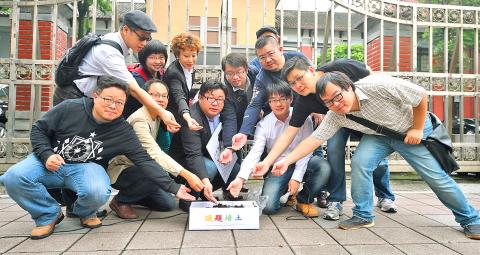A group of authors and professors of literature yesterday gathered outside the Legislative Yuan in Taipei to protest against the new high-school Chinese language curriculum which reincorporates a high percentage of classical Chinese material while neglecting Taiwanese and contemporary literature.
Na Su-phok (藍士博), one of the founders of the Alliance of the Young Safeguarding Taiwanese Literature and History, said that while concerns have been raised against the adjustments made to the history and civil education curriculum guidelines, there have been relatively few objections made public against the adjusted curriculum for Mandarin Chinese-language study.
However, that does not mean that the adjusted Chinese-language curriculum is problem-free, Na said.

Photo: Wang Min-wei, Taipei Times
“On the contrary, the problem is serious to the point that [the curriculum] is in the intensive care unit,” Na said.
Chu Yu-hsun (朱宥勳), a young author of several books and editor of anthologies of contemporary Taiwanese fiction and essays, said that the percentage of classical Chinese has been raised from 55 percent to 65 percent, with less flexibility.
What is more, according to Chu, a subject called “Chinese culture basic materials” has been singularly highlighted in the new guidelines, which suggests that is to be set up as an elective.
Classical Chinese literature is set to take up 72 percent of the allocated learning hours for Chinese-language study, Chu said.
He opposed the arrangement, saying that the curriculum should be designed to introduce young students to literature “from recent to ancient times and from easily accessible texts to works that require further interpretation.”
Earlier this week, another group of academics also drew attention to the new Chinese-language curriculum.
Referring to themselves as the Alliance for Saving the Education of Chinese Language, the group campaigned for even more class hours for Chinese and the adaptation of “Chinese culture basic materials” as a required course.
The alliance, led by National Taiwan University political science professor Chang Ya-chung (張亞中), who is also the chairman of the pro-unification Chinese Integration Association, has said that younger generations — without the cultivation of Chinese culture — have become empty, “with no identity, confidence, patience, vision, direction or viewpoint.”
Chang also said that more Chinese-language learning hours would equate to “more filial piety and sibling love.”
Former Soochow University president and alliance member Liu Yuan-chun (劉源俊) said he worried that Taiwan “would become the next Philippines,” if Chinese culture continued to lose its influence in public education in Taiwan.
Their comments have since been widely ridiculed and criticized as a “great Chinese superiority complex,” and as examples of explicit racism for deeming other cultures to be less sophisticated and less worthy of respect.

Chinese Nationalist Party (KMT) Chairman Eric Chu (朱立倫), spokeswoman Yang Chih-yu (楊智伃) and Legislator Hsieh Lung-chieh (謝龍介) would be summoned by police for questioning for leading an illegal assembly on Thursday evening last week, Minister of the Interior Liu Shyh-fang (劉世芳) said today. The three KMT officials led an assembly outside the Taipei City Prosecutors’ Office, a restricted area where public assembly is not allowed, protesting the questioning of several KMT staff and searches of KMT headquarters and offices in a recall petition forgery case. Chu, Yang and Hsieh are all suspected of contravening the Assembly and Parade Act (集會遊行法) by holding

PRAISE: Japanese visitor Takashi Kubota said the Taiwanese temple architecture images showcased in the AI Art Gallery were the most impressive displays he saw Taiwan does not have an official pavilion at the World Expo in Osaka, Japan, because of its diplomatic predicament, but the government-backed Tech World pavilion is drawing interest with its unique recreations of works by Taiwanese artists. The pavilion features an artificial intelligence (AI)-based art gallery showcasing works of famous Taiwanese artists from the Japanese colonial period using innovative technologies. Among its main simulated displays are Eastern gouache paintings by Chen Chin (陳進), Lin Yu-shan (林玉山) and Kuo Hsueh-hu (郭雪湖), who were the three young Taiwanese painters selected for the East Asian Painting exhibition in 1927. Gouache is a water-based

Taiwan would welcome the return of Honduras as a diplomatic ally if its next president decides to make such a move, Minister of Foreign Affairs Lin Chia-lung (林佳龍) said yesterday. “Of course, we would welcome Honduras if they want to restore diplomatic ties with Taiwan after their elections,” Lin said at a meeting of the legislature’s Foreign Affairs and National Defense Committee, when asked to comment on statements made by two of the three Honduran presidential candidates during the presidential campaign in the Central American country. Taiwan is paying close attention to the region as a whole in the wake of a

OFF-TARGET: More than 30,000 participants were expected to take part in the Games next month, but only 6,550 foreign and 19,400 Taiwanese athletes have registered Taipei city councilors yesterday blasted the organizers of next month’s World Masters Games over sudden timetable and venue changes, which they said have caused thousands of participants to back out of the international sporting event, among other organizational issues. They also cited visa delays and political interference by China as reasons many foreign athletes are requesting refunds for the event, to be held from May 17 to 30. Jointly organized by the Taipei and New Taipei City governments, the games have been rocked by numerous controversies since preparations began in 2020. Taipei City Councilor Lin Yen-feng (林延鳳) said yesterday that new measures by